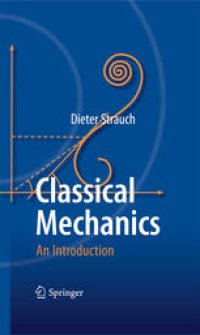
Ebook: Classical Mechanics: An Introduction
Author: Dieter Strauch (auth.)
- Genre: Physics
- Tags: Geometry, Dynamical Systems and Ergodic Theory, Mathematical Methods in Physics, Applications of Mathematics, Theoretical and Applied Mechanics, Mechanics
- Year: 2009
- Publisher: Springer-Verlag Berlin Heidelberg
- Edition: 1
- Language: English
- pdf
This upper-level undergraduate and beginning graduate textbook primarily covers the theory and application of Newtonian and Lagrangian, but also of Hamiltonian mechanics. In addition, included are elements of continuum mechanics and the accompanying classical field theory, wherein four-vector notation is introduced without explicit reference to special relativity. The author's writing style attempts to ease students through the primary and secondary results, thus building a solid foundation for understanding applications. So the text is thus structured around developments of the main ideas, explicit proofs, and numerous clarifications, comments and applications. Numerous examples illustrate the material and often present alternative approaches to the final results. Frequent references are made linking mechanics to other fields of physics. These lecture notes have been used frequently by students to prepare for written and/or oral examinations. Summaries and problems conclude chapters and appendices supply needed background topics.
This upper-level undergraduate and beginning graduate textbook primarily covers the theory and application of Newtonian and Lagrangian, but also of Hamiltonian mechanics. In addition, included are elements of continuum mechanics and the accompanying classical field theory, wherein four-vector notation is introduced without explicit reference to special relativity. The author's writing style attempts to ease students through the primary and secondary results, thus building a solid foundation for understanding applications. So the text is thus structured around developments of the main ideas, explicit proofs, and numerous clarifications, comments and applications. Numerous examples illustrate the material and often present alternative approaches to the final results. Frequent references are made linking mechanics to other fields of physics. These lecture notes have been used frequently by students to prepare for written and/or oral examinations. Summaries and problems conclude chapters and appendices supply needed background topics.